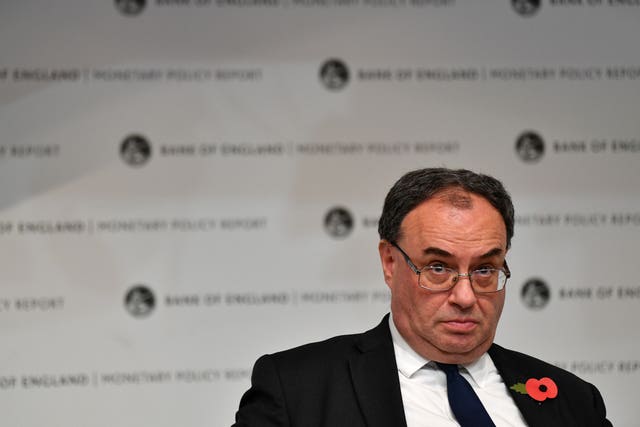
Interest rates look set to rise before Christmas after last month’s bigger-than-expected leap in the cost of living.
This has fuelled expectations that policymakers will act next month to cool rampant inflation.
Most economists are forecasting that rates will rise to 0.25% in December from their all-time low of 0.1% as pressure mounts on the Bank of England to rein in inflation.
A mounting cost of living crisis in the UK has seen prices rise across the board – for energy, fuel, food, cars, furniture and eating out.
Inflation has reached levels not seen for nearly a decade in the UK as the global economy reopens and amid mounting supply chain disruption.
The Bank warned earlier this month it may have to increase rates in the “coming months” as it forecast inflation peaking at 5% next April.
It held off from an increase at the November meeting to assess how the jobs market was holding up after the end of furlough.
Robust jobs data on Tuesday showed another 160,000 workers were added to UK payrolls in October and no large uptick in redundancies, despite furlough coming to a close on September 30.
This, coupled with inflation coming in at a higher than forecast 4.2% for October, is widely expected to see the Bank raise rates at its next meeting on December 16.
Economist Ellie Henderson at Investec said: “With CPI inflation moving further away from the Bank of England’s 2% target, there is now even more pressure on the MPC to act to rein in price growth at its upcoming December meeting.”
Financial markets are also betting on another rate rise to 0.5% in February, which has sent the pound higher against the US dollar and the euro.

Bank governor Andrew Bailey told MPs on Monday he was “very uneasy” about spiking inflation, though rate-setters still believe the surge in inflation will largely be temporary and fall back over the second half of 2022.
But Ms Henderson said: “As price pressures are yet to show any signs of abating, nerves by policymakers are becoming ever more present.”
She said the outlook for further rate rises “will be dependent on a combination of labour market conditions and how ‘transitory’ inflation in the UK proves to be”.
Wages have been rising at a fast clip, which is partly fuelling the inflation spiral, with total average weekly earnings up 5.8% between July and September.
But underlying wage growth is seen as being far lower, as the figures have been skewed by certain factors, with lower paid jobs being hit hardest by the pandemic.
The Bank’s Monetary Policy Committee (MPC) will be closely watching the wage picture over the coming months as it weighs up its rates response, according to JP Morgan economist Allan Monks.
He said: “The upside inflation surprise will raise questions about whether the MPC will have to move more quickly, but we continue to think the MPC will not deliver more than 15bps in December; doing so would risk encouraging more aggressive pricing for next year which at the November meeting the BoE went out of its way to push back on.”
“We think the next hike will come in May, but the pace of tightening next year will likely depend critically on how wage inflation responds to the tighter labour market,” he added.


Why are you making commenting on The National only available to subscribers?
We know there are thousands of National readers who want to debate, argue and go back and forth in the comments section of our stories. We’ve got the most informed readers in Scotland, asking each other the big questions about the future of our country.
Unfortunately, though, these important debates are being spoiled by a vocal minority of trolls who aren’t really interested in the issues, try to derail the conversations, register under fake names, and post vile abuse.
So that’s why we’ve decided to make the ability to comment only available to our paying subscribers. That way, all the trolls who post abuse on our website will have to pay if they want to join the debate – and risk a permanent ban from the account that they subscribe with.
The conversation will go back to what it should be about – people who care passionately about the issues, but disagree constructively on what we should do about them. Let’s get that debate started!
Callum Baird, Editor of The National
Comments: Our rules
We want our comments to be a lively and valuable part of our community - a place where readers can debate and engage with the most important local issues. The ability to comment on our stories is a privilege, not a right, however, and that privilege may be withdrawn if it is abused or misused.
Please report any comments that break our rules.
Read the rules here